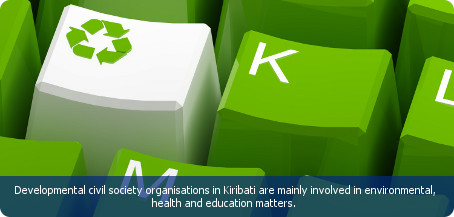Find Civil Society expertise in Kiribati

Developmental civil society organisations in Kiribati are mainly involved in environmental, health and education matters. Conservation International and Amnesty International have previously supported an abundance of projects. Likewise, Kiribati’s trade unions accommodate for a multitude of sectors.
The work of non-governmental organisations (NGOs) such as Te Toa Matoa has been valuable towards the attainment of Education for All (EFA) goals. Te Toa Matoa is a organisation for disabled people, whose aim is to promote disability awareness in all Kiribati’s communities. Its activities have helped change attitudes towards the disabled and made schools more inclusive in regards to the disabled.
NGOs are involved in various environmental and sustainable development programmes. The Kaoki Mange (Return the Rubbish) project was started by an NGO, Foundation of the Peoples of the South Pacific-Kiribati. The project was later adopted nationally with the help of the government and private sector. As a result of the success of such projects Kiribati was named Regional Champion for the 2005 ‘Year of Action Against Waste’ for the Pacific Region.
The Kiribati Association of Non-Government Organisations (KANGO) is the official umbrella organisation for the 39 indigenous Kiribati NGOs. KANGO’s role is to support and empower the local NGO community and to achieve their developmental goals through their own initiatives, and working in partnership with government and donors particularly the New Zealand International Aid and Development Agency (NZAID). Organisations seeking official recognition as NGOs should apply to the Registrar of Societies.
The Kiribati Trade Union Congress (KTUC) is the national trade union organisation and is associated with the International Trade Union Confederation. Strikes rarely occur, despite the law allowing workers to strike.



